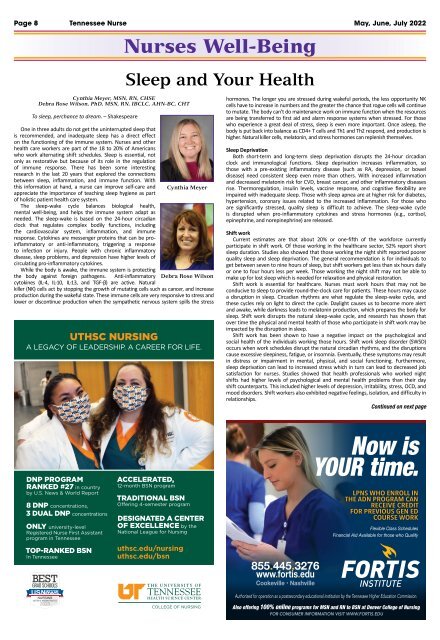Tennessee Nurse - May 2022
You also want an ePaper? Increase the reach of your titles
YUMPU automatically turns print PDFs into web optimized ePapers that Google loves.
Page 8 <strong>Tennessee</strong> <strong>Nurse</strong> <strong>May</strong>, June, July <strong>2022</strong><br />
<strong>Nurse</strong>s Well-Being<br />
Sleep and Your Health<br />
Cynthia Meyer, MSN, RN, CHSE<br />
Debra Rose Wilson, PhD, MSN, RN, IBCLC, AHN-BC, CHT<br />
To sleep, perchance to dream. – Shakespeare<br />
One in three adults do not get the uninterrupted sleep that<br />
is recommended, and inadequate sleep has a direct effect<br />
on the functioning of the immune system. <strong>Nurse</strong>s and other<br />
health care workers are part of the 18 to 20% of Americans<br />
who work alternating shift schedules. Sleep is essential, not<br />
only as restorative but because of its role in the regulation<br />
of immune response. There has been some interesting<br />
research in the last 20 years that explored the connections<br />
between sleep, inflammation, and immune function. With<br />
this information at hand, a nurse can improve self-care and Cynthia Meyer<br />
appreciate the importance of teaching sleep hygiene as part<br />
of holistic patient health care system.<br />
The sleep-wake cycle balances biological health,<br />
mental well-being, and helps the immune system adapt as<br />
needed. The sleep-wake is based on the 24-hour circadian<br />
clock that regulates complex bodily functions, including<br />
the cardiovascular system, inflammation, and immune<br />
response. Cytokines are messenger proteins that can be proinflammatory<br />
or anti-inflammatory, triggering a response<br />
to infection or injury. People with chronic inflammatory<br />
disease, sleep problems, and depression have higher levels of<br />
circulating pro-inflammatory cytokines.<br />
While the body is awake, the immune system is protecting<br />
the body against foreign pathogens. Anti-inflammatory Debra Rose Wilson<br />
cytokines (IL-4, IL-10, IL-13, and TGF-β) are active. Natural<br />
killer (NK) cells act by stopping the growth of mutating cells such as cancer, and increase<br />
production during the wakeful state. These immune cells are very responsive to stress and<br />
lower or discontinue production when the sympathetic nervous system spills the stress<br />
hormones. The longer you are stressed during wakeful periods, the less opportunity NK<br />
cells have to increase in numbers and the greater the chance that rogue cells will continue<br />
to mutate. The body can’t do maintenance work on immune function when the resources<br />
are being transferred to first aid and alarm response systems when stressed. For those<br />
who experience a great deal of stress, sleep is even more important. Once asleep, the<br />
body is put back into balance as CD4+ T cells and Th1 and Th2 respond, and production is<br />
higher. Natural killer cells, melatonin, and stress hormones can replenish themselves.<br />
Sleep Deprivation<br />
Both short-term and long-term sleep deprivation disrupts the 24-hour circadian<br />
clock and immunological functions. Sleep deprivation increases inflammation, so<br />
those with a pre-existing inflammatory disease (such as RA, depression, or bowel<br />
disease) need consistent sleep even more than others. With increased inflammation<br />
and decreased melatonin risk for CVD, breast cancer, and other inflammatory diseases<br />
rise. Thermoregulation, insulin levels, vaccine response, and cognitive flexibility are<br />
impaired with inadequate sleep. Those with sleep apnea are at higher risk for diabetes,<br />
hypertension, coronary issues related to the increased inflammation. For those who<br />
are significantly stressed, quality sleep is difficult to achieve. The sleep-wake cycle<br />
is disrupted when pro-inflammatory cytokines and stress hormones (e.g., cortisol,<br />
epinephrine, and norepinephrine) are released.<br />
Shift work<br />
Current estimates are that about 20% or one-fifth of the workforce currently<br />
participate in shift work. Of those working in the healthcare sector, 52% report short<br />
sleep duration. Studies also showed that those working the night shift reported poorer<br />
quality sleep and sleep deprivation. The general recommendation is for individuals to<br />
get between seven to nine hours of sleep, but shift workers get less than six hours daily<br />
or one to four hours less per week. Those working the night shift may not be able to<br />
make up for lost sleep which is needed for relaxation and physical restoration.<br />
Shift work is essential for healthcare. <strong>Nurse</strong>s must work hours that may not be<br />
conducive to sleep to provide round-the-clock care for patients. These hours may cause<br />
a disruption in sleep. Circadian rhythms are what regulate the sleep-wake cycle, and<br />
these cycles rely on light to direct the cycle. Daylight causes us to become more alert<br />
and awake, while darkness leads to melatonin production, which prepares the body for<br />
sleep. Shift work disrupts the natural sleep-wake cycle, and research has shown that<br />
over time the physical and mental health of those who participate in shift work may be<br />
impacted by the disruption in sleep.<br />
Shift work has been shown to have a negative impact on the psychological and<br />
social health of the individuals working those hours. Shift work sleep disorder (SWSD)<br />
occurs when work schedules disrupt the natural circadian rhythms, and the disruptions<br />
cause excessive sleepiness, fatigue, or insomnia. Eventually, these symptoms may result<br />
in distress or impairment in mental, physical, and social functioning. Furthermore,<br />
sleep deprivation can lead to increased stress which in turn can lead to decreased job<br />
satisfaction for nurses. Studies showed that health professionals who worked night<br />
shifts had higher levels of psychological and mental health problems than their day<br />
shift counterparts. This included higher levels of depression, irritability, stress, OCD, and<br />
mood disorders. Shift workers also exhibited negative feelings, isolation, and difficulty in<br />
relationships.<br />
Continued on next page

















